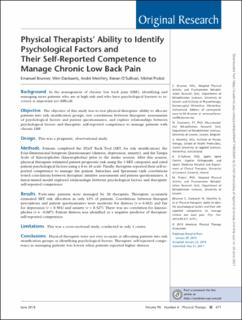Bitte benutzen Sie diese Kennung, um auf die Ressource zu verweisen:
https://doi.org/10.21256/zhaw-12317| Publikationstyp: | Beitrag in wissenschaftlicher Zeitschrift |
| Art der Begutachtung: | Peer review (Publikation) |
| Titel: | Physical therapists’ ability to identify psychological factors and their self-reported competence to manage chronic low back pain |
| Autor/-in: | Probst, Michel Brunner, Emanuel Meichtry, André O’Sullivan, Kieran Baldew, Se-Sergio Dankaerts, Wim |
| DOI: | 10.1093/ptj/pzy012 10.21256/zhaw-12317 |
| Erschienen in: | Physical Therapy |
| Band(Heft): | 98 |
| Heft: | 6 |
| Seite(n): | 471 |
| Seiten bis: | 479 |
| Erscheinungsdatum: | 1-Jun-2018 |
| Verlag / Hrsg. Institution: | Oxford University Press |
| ISSN: | 0031-9023 1538-6724 |
| Sprache: | Englisch |
| Fachgebiet (DDC): | 615.82: Physiotherapie 617.5: Orthopädische Chirurgie |
| Zusammenfassung: | Background: In the management of chronic low back pain (LBP), identifying and managing more patients who are at high risk and who have psychological barriers to recovery is important yet difficult. Objective: The objective of this study was to test physical therapists’ ability to allocate patients into risk stratification groups, test correlations between therapists’ assessments of psychological factors and patient questionnaires, and explore relationships between psychological factors and therapists’ self-reported competence to manage patients with chronic LBP. Design: This was a pragmatic, observational study. Methods: Patients completed the STarT Back Tool (SBT, for risk stratification), the Four-Dimensional Symptom Questionnaire (distress, depression, anxiety), and the Tampa Scale of Kinesiophobia (kinesiophobia) prior to the intake session. After this session, physical therapists estimated patient prognostic risk using the 3 SBT categories and rated patient psychological factors using a 0-to-10 scale. Finally, therapists reported their self-reported competence to manage the patient. Intraclass and Spearman rank correlations tested correlations between therapists’ intuitive assessments and patient questionnaires. A linear-mixed model explored relationships between psychological factors and therapists’ self-reported competence. Results: Forty-nine patients were managed by 20 therapists. Therapists accurately estimated SBT risk allocation in only 41% of patients. Correlations between therapist perceptions and patient questionnaires were moderate for distress (r = 0.602) and fair for depression (r = 0.304) and anxiety (r = 0.327). There was no correlation for kinesiophobia (r = −0.007). Patient distress was identified as a negative predictor of therapists’ self–reported competence. Limitations: This was a cross-sectional study, conducted in only 1 center. Conclusions: Physical therapists were not very accurate at allocating patients into risk stratification groups or identifying psychological factors. Therapists’ self-reported competence in managing patients was lowest when patients reported higher distress. |
| Weitere Angaben: | Erworben im Rahmen der Schweizer Nationallizenzen (http://www.nationallizenzen.ch) |
| URI: | https://digitalcollection.zhaw.ch/handle/11475/12317 |
| Volltext Version: | Publizierte Version |
| Lizenz (gemäss Verlagsvertrag): | Lizenz gemäss Verlagsvertrag |
| Gesperrt bis: | 2022-01-01 |
| Departement: | Gesundheit |
| Organisationseinheit: | Institut für Physiotherapie (IPT) |
| Enthalten in den Sammlungen: | Publikationen Gesundheit |
Dateien zu dieser Ressource:
| Datei | Beschreibung | Größe | Format | |
|---|---|---|---|---|
| 2018_Brunner-etal_Physical-therapists-ability-to-identify-psychological-factors.pdf | 423.3 kB | Adobe PDF |  Öffnen/Anzeigen |
Zur Langanzeige
Probst, M., Brunner, E., Meichtry, A., O’Sullivan, K., Baldew, S.-S., & Dankaerts, W. (2018). Physical therapists’ ability to identify psychological factors and their self-reported competence to manage chronic low back pain. Physical Therapy, 98(6), 471–479. https://doi.org/10.1093/ptj/pzy012
Probst, M. et al. (2018) ‘Physical therapists’ ability to identify psychological factors and their self-reported competence to manage chronic low back pain’, Physical Therapy, 98(6), pp. 471–479. Available at: https://doi.org/10.1093/ptj/pzy012.
M. Probst, E. Brunner, A. Meichtry, K. O’Sullivan, S.-S. Baldew, and W. Dankaerts, “Physical therapists’ ability to identify psychological factors and their self-reported competence to manage chronic low back pain,” Physical Therapy, vol. 98, no. 6, pp. 471–479, Jun. 2018, doi: 10.1093/ptj/pzy012.
PROBST, Michel, Emanuel BRUNNER, André MEICHTRY, Kieran O’SULLIVAN, Se-Sergio BALDEW und Wim DANKAERTS, 2018. Physical therapists’ ability to identify psychological factors and their self-reported competence to manage chronic low back pain. Physical Therapy. 1 Juni 2018. Bd. 98, Nr. 6, S. 471–479. DOI 10.1093/ptj/pzy012
Probst, Michel, Emanuel Brunner, André Meichtry, Kieran O’Sullivan, Se-Sergio Baldew, and Wim Dankaerts. 2018. “Physical Therapists’ Ability to Identify Psychological Factors and Their Self-Reported Competence to Manage Chronic Low Back Pain.” Physical Therapy 98 (6): 471–79. https://doi.org/10.1093/ptj/pzy012.
Probst, Michel, et al. “Physical Therapists’ Ability to Identify Psychological Factors and Their Self-Reported Competence to Manage Chronic Low Back Pain.” Physical Therapy, vol. 98, no. 6, June 2018, pp. 471–79, https://doi.org/10.1093/ptj/pzy012.
Alle Ressourcen in diesem Repository sind urheberrechtlich geschützt, soweit nicht anderweitig angezeigt.